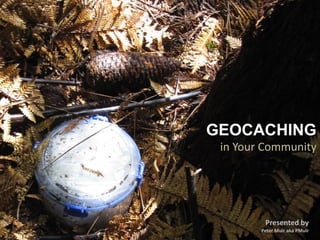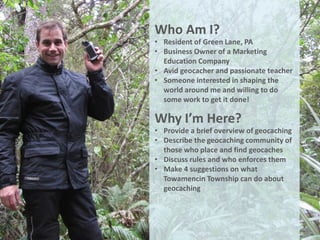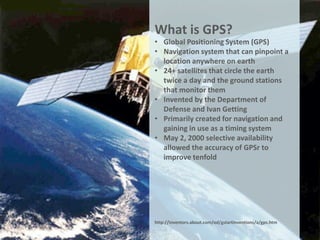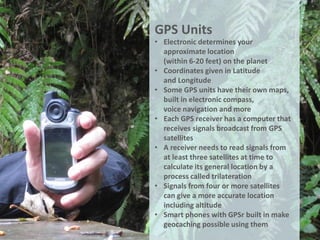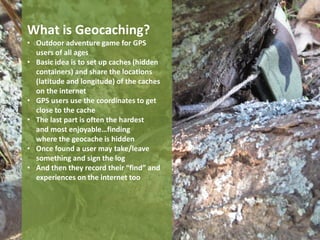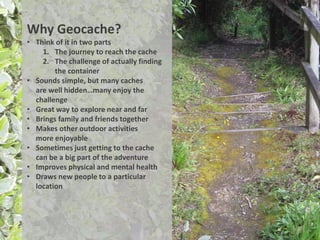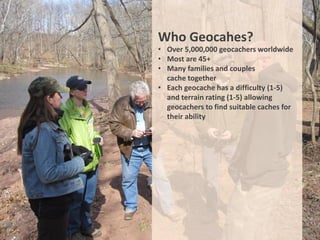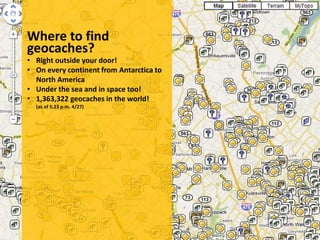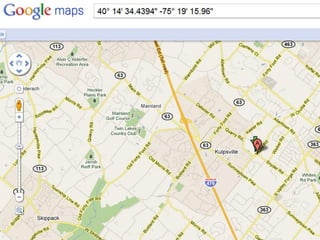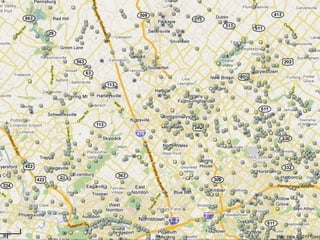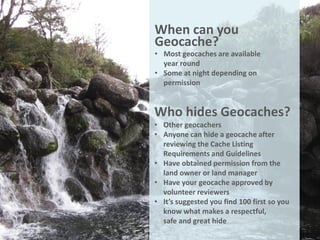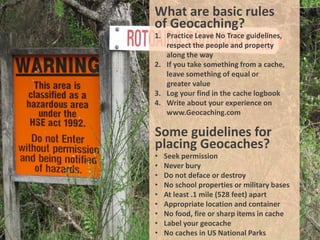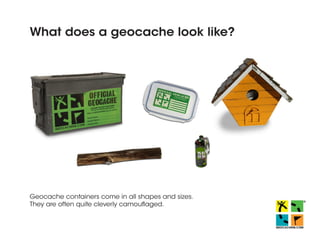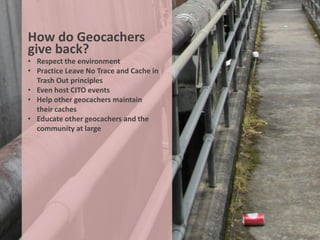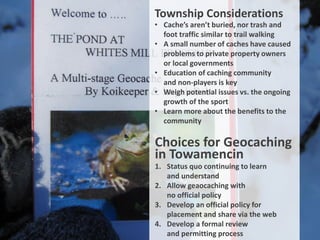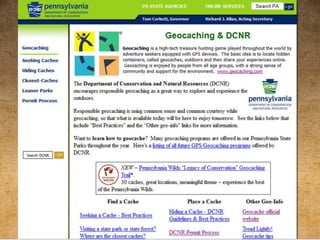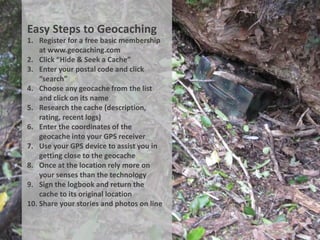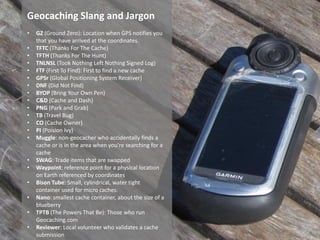Geocaching for Townships
- 1. GEOCACHING in Your Community Presented by Peter Muir aka PMuir
- 2. Who Am I? âĒ Resident of Green Lane, PA âĒ Business Owner of a Marketing Education Company âĒ Avid geocacher and passionate teacher âĒ Someone interested in shaping the world around me and willing to do some work to get it done! Why Iâm Here? âĒ Provide a brief overview of geocaching âĒ Describe the geocaching community of those who place and find geocaches âĒ Discuss rules and who enforces them âĒ Make 4 suggestions on what Towamencin Township can do about geocaching
- 3. What is GPS? âĒ Global Positioning System (GPS) âĒ Navigation system that can pinpoint a location anywhere on earth âĒ 24+ satellites that circle the earth twice a day and the ground stations that monitor them âĒ Invented by the Department of Defense and Ivan Getting âĒ Primarily created for navigation and gaining in use as a timing system âĒ May 2, 2000 selective availability allowed the accuracy of GPSr to improve tenfold http://inventors.about.com/od/gstartinventions/a/gps.htm
- 4. GPS Units âĒ Electronic determines your approximate location (within 6-20 feet) on the planet âĒ Coordinates given in Latitude and Longitude âĒ Some GPS units have their own maps, built in electronic compass, voice navigation and more âĒ Each GPS receiver has a computer that receives signals broadcast from GPS satellites âĒ A receiver needs to read signals from at least three satellites at time to calculate its general location by a process called trilateration âĒ Signals from four or more satellites can give a more accurate location including altitude âĒ Smart phones with GPSr built in make geocaching possible using them
- 5. What is Geocaching? âĒ Outdoor adventure game for GPS users of all ages âĒ Basic idea is to set up caches (hidden containers) and share the locations (latitude and longitude) of the caches on the internet âĒ GPS users use the coordinates to get close to the cache âĒ The last part is often the hardest and most enjoyableâĶfinding where the geocache is hidden âĒ Once found a user may take/leave something and sign the log âĒ And then they record their âfindâ and experiences on the internet too
- 6. Why Geocache? âĒ Think of it in two parts 1. The journey to reach the cache 2. The challenge of actually finding the container âĒ Sounds simple, but many caches are well hiddenâĶmany enjoy the challenge âĒ Great way to explore near and far âĒ Brings family and friends together âĒ Makes other outdoor activities more enjoyable âĒ Sometimes just getting to the cache can be a big part of the adventure âĒ Improves physical and mental health âĒ Draws new people to a particular location
- 7. Who Geocahes? âĒ Over 5,000,000 geocachers worldwide âĒ Most are 45+ âĒ Many families and couples cache together âĒ Each geocache has a difficulty (1-5) and terrain rating (1-5) allowing geocachers to find suitable caches for their ability
- 8. Where to find geocaches? âĒ Right outside your door! âĒ On every continent from Antarctica to North America âĒ Under the sea and in space too! âĒ 1,363,322 geocaches in the world! (as of 5:23 p.m. 4/27)
- 11. When can you Geocache? âĒ Most geocaches are available year round âĒ Some at night depending on permission Who hides Geocaches? âĒ Other geocachers âĒ Anyone can hide a geocache after reviewing the Cache Listing Requirements and Guidelines âĒ Have obtained permission from the land owner or land manager âĒ Have your geocache approved by volunteer reviewers âĒ Itâs suggested you find 100 first so you know what makes a respectful, safe and great hide
- 12. What are basic rules of Geocaching? 1. Practice Leave No Trace guidelines, respect the people and property along the way 2. If you take something from a cache, leave something of equal or greater value 3. Log your find in the cache logbook 4. Write about your experience on www.Geocaching.com Some guidelines for placing Geocaches? âĒ Seek permission âĒ Never bury âĒ Do not deface or destroy âĒ No school properties or military bases âĒ At least .1 mile (528 feet) apart âĒ Appropriate location and container âĒ No food, fire or sharp items in cache âĒ Label your geocache âĒ No caches in US National Parks
- 14. How do Geocachers give back? âĒ Respect the environment âĒ Practice Leave No Trace and Cache in Trash Out principles âĒ Even host CITO events âĒ Help other geocachers maintain their caches âĒ Educate other geocachers and the community at large
- 15. Township Considerations âĒ Cacheâs arenât buried, nor trash and foot traffic similar to trail walking âĒ A small number of caches have caused problems to private property owners or local governments âĒ Education of caching community and non-players is key âĒ Weigh potential issues vs. the ongoing growth of the sport âĒ Learn more about the benefits to the community Choices for Geocaching in Towamencin 1. Status quo continuing to learn and understand 2. Allow geaocaching with no official policy 3. Develop an official policy for placement and share via the web 4. Develop a formal review and permitting process
- 17. Easy Steps to Geocaching 1. Register for a free basic membership at www.geocaching.com 2. Click âHide & Seek a Cacheâ 3. Enter your postal code and click âsearchâ 4. Choose any geocache from the list and click on its name 5. Research the cache (description, rating, recent logs) 6. Enter the coordinates of the geocache into your GPS receiver 7. Use your GPS device to assist you in getting close to the geocache 8. Once at the location rely more on your senses than the technology 9. Sign the logbook and return the cache to its original location 10. Share your stories and photos on line
- 18. Geocaching Slang and Jargon âĒ GZ (Ground Zero): Location when GPS notifies you that you have arrived at the coordinates. âĒ TFTC (Thanks For The Cache) âĒ TFTH (Thanks For The Hunt) âĒ TNLNSL (Took Nothing Left Nothing Signed Log) âĒ FTF (First To Find): First to find a new cache âĒ GPSr (Global Positioning System Receiver) âĒ DNF (Did Not Find) âĒ BYOP (Bring Your Own Pen) âĒ C&D (Cache and Dash) âĒ PNG (Park and Grab) âĒ TB (Travel Bug) âĒ CO (Cache Owner) âĒ PI (Poision Ivy) âĒ Muggle: non-geocacher who accidentally finds a cache or is in the area when you're searching for a cache âĒ SWAG: Trade items that are swapped âĒ Waypoint: reference point for a physical location on Earth referenced by coordinates âĒ Bison Tube: Small, cylindrical, water tight container used for micro caches. âĒ Nano: smallest cache container, about the size of a blueberry âĒ TPTB (The Powers That Be): Those who run Geocaching.com âĒ Reviewer: Local volunteer who validates a cache submission

